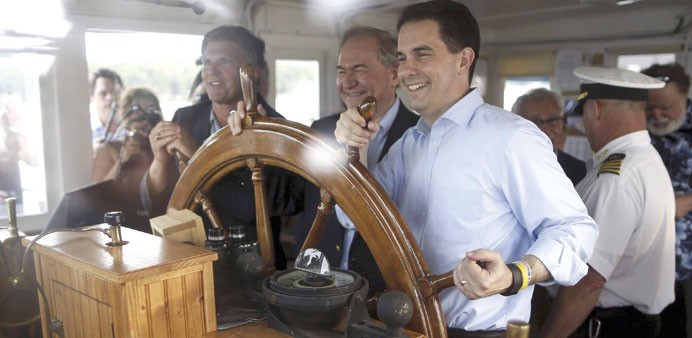Wisconsin Governor Scott Walker (right) poses with former governors Jim Gilmore of Virginia (centre) and Bob Ehrlich of Maryland (left) during a sunset cruise with the Belknap County Republicans in Laconia, New Hampshire, in a file photo. Walker, a two-term governor of Wisconsin, announced his bid for the Republican presidential nomination yesterday.
AFP/Washington
Wisconsin Governor Scott Walker officially confirmed yesterday he was joining the crowded field of Republicans jostling for the party’s 2016 nomination as US presidential candidate.
Walker, who went from relative obscurity to national attention because of his protracted battle with labour unions, declared his widely expected White House run on Twitter and was due to make a speech in his home state later in the day.
“I’m in. I’m running for president because Americans deserve a leader who will fight and win for them,” he wrote.
Walker, 47, becomes the 15th major Republican to join the race. A 16th, Ohio Governor John Kasich, is expected to enter later this month.
Walker is currently polling in second place behind Jeb Bush across a range of surveys, according to RealClearPolitics.com.
His announcement to run comes as no surprise - he has publicly mulled a bid for months and his staff said nearly two weeks ago that he was filing the necessary papers.
Former secretary of state Hillary Clinton is the favourite to win the Democratic nomination in the race to succeed President Barack Obama.
Walker instituted a series of conservative reforms in Wisconsin, including major tax cuts, a right-to-work law that makes union dues voluntary instead of mandatory, a tightening of abortion laws and reining in of state regulations.
“I’m a conservative because I believe in a smaller government, lower taxes and a free market that helps businesses succeed and hire,” Walker wrote in a campaign e-mail.
“My conservative values come from being raised in a small town by a Baptist minister and a bookkeeper. I was taught that with courage, hard work and a strong faith you can accomplish anything.”
He was a virtual unknown in the US until 2011, when his plan to reduce the collective bargaining power of state employees brought the wrath of unions, whose members led intense demonstrations in Wisconsin’s capital city of Madison.
Congresswoman Debbie Wasserman Schultz, the chair of the Democratic National Committee, was quick to attack Walker’s record.

